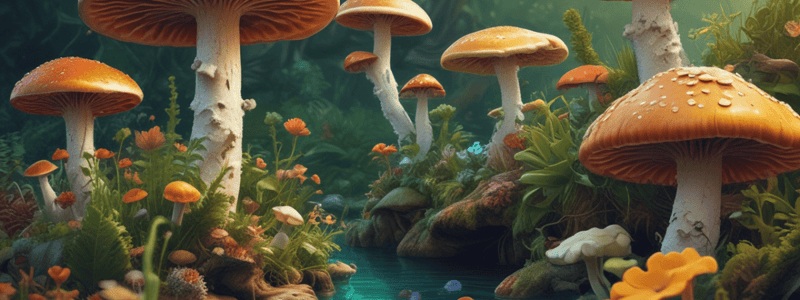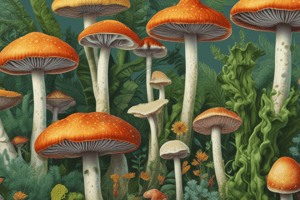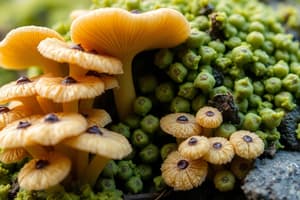Podcast
Questions and Answers
What is a key characteristic of fungi?
What is a key characteristic of fungi?
- Decomposition of organic matter (correct)
- Ability to produce oxygen
- Formation of complex carbohydrates
- Capability to photosynthesize
Which kingdom does algae belong to?
Which kingdom does algae belong to?
- Protista
- Bacteria
- Plantae (correct)
- Mycota
What is the main role of fungi in recycling nutrients?
What is the main role of fungi in recycling nutrients?
- Creating energy for plants
- Producing complex molecules
- Decomposing organic matter (correct)
- Causing diseases in animals
Which type of fungi helps plants absorb water and minerals from the soil?
Which type of fungi helps plants absorb water and minerals from the soil?
What process do fungi contribute to that aids in a healthy ecological balance?
What process do fungi contribute to that aids in a healthy ecological balance?
Which of the following fungi causes diseases in plants and humans?
Which of the following fungi causes diseases in plants and humans?
What is a common way fungi contribute to modern agriculture?
What is a common way fungi contribute to modern agriculture?
What is the primary role of algae in aquatic ecosystems?
What is the primary role of algae in aquatic ecosystems?
Which statement about algae blooms in freshwater environments is accurate?
Which statement about algae blooms in freshwater environments is accurate?
Which of the following is NOT a characteristic of algae?
Which of the following is NOT a characteristic of algae?
What is the primary difference between the roles of fungi and algae in their respective ecosystems?
What is the primary difference between the roles of fungi and algae in their respective ecosystems?
Which of the following statements about algae is incorrect?
Which of the following statements about algae is incorrect?
Which of the following applications of fungi is NOT mentioned in the text?
Which of the following applications of fungi is NOT mentioned in the text?
What is one of the potential consequences of algae blooms in freshwater environments?
What is one of the potential consequences of algae blooms in freshwater environments?
Which of the following statements about the roles of fungi and algae is accurate?
Which of the following statements about the roles of fungi and algae is accurate?
Flashcards are hidden until you start studying
Study Notes
Fungi and algae are two distinct groups of organisms that play important roles in their respective ecosystems. While they are often classified under the domain Eukarya due to their complex cell structures, fungi belong to the kingdom Mycota while algae form the kingdom Plantae. Here is a brief overview of these fascinating organisms:
Fungi
Fungi are characterized by their ability to decompose organic matter, such as dead plants and animals, turning it into nutrients that can be used by other living beings. They also produce enzymes that break down complex molecules like cellulose and lignin, which are present in plant cell walls. This decomposition process helps recycle nutrients back into the soil, contributing to a healthy ecological balance. There are three main types of fungi: yeasts, molds, and mushrooms.
Some fungi have symbiotic relationships with plants, forming mycorrhizal associations where the fungi help the plants absorb water and minerals from the soil in exchange for sugars produced by photosynthesis. Other fungi cause diseases in plants and humans, most notably those responsible for food spoilage and human pathogens such as Candida, Aspergillus, and Black mold.
In addition to their role in decomposition and mutualistic partnerships, fungi contribute significantly to modern agriculture through biotechnology processes involving molecular farming and direct application methods. These applications range from producing enzymes with industrial value to bioremediation of polluted environments.
Algae
Algae are primarily known for their ability to perform photosynthesis, converting sunlight, water, and carbon dioxide into glucose and oxygen. They are the base of the marine food chain and provide energy for aquatic ecosystems. Some algae can be found in freshwater environments as well, forming blooms that can lead to oxygen depletion and fish kills.
Algae come in various forms, from unicellular microbes to multicellular organisms like kelp and seaweed. They also serve as the primary food source for many marine animals, such as fish and mollusks, and are an essential component of the marine food chain.
Conclusion
Understanding the roles of fungi and algae in their respective ecosystems is crucial for maintaining a healthy balance in the natural world. Fungi contribute to decomposition and nutrient recycling, while algae form the base of marine food chains and provide essential oxygen through photosynthesis. As we continue to explore the complex web of life, these organisms will undoubtedly reveal more secrets and applications for human benefit.
Studying That Suits You
Use AI to generate personalized quizzes and flashcards to suit your learning preferences.




